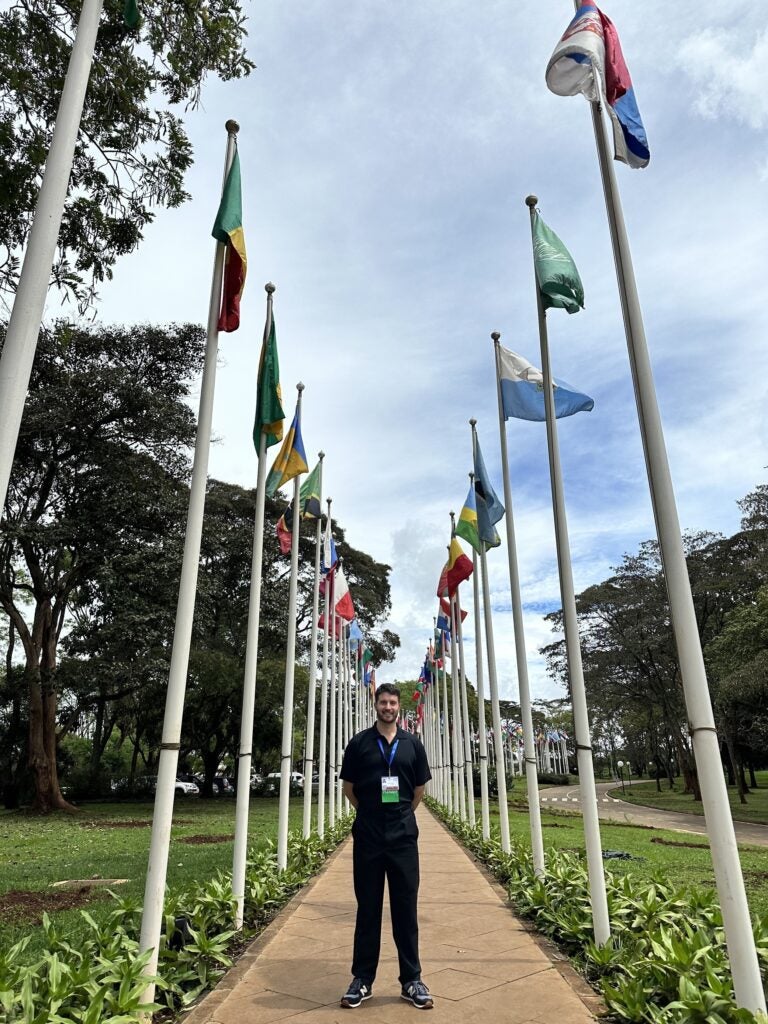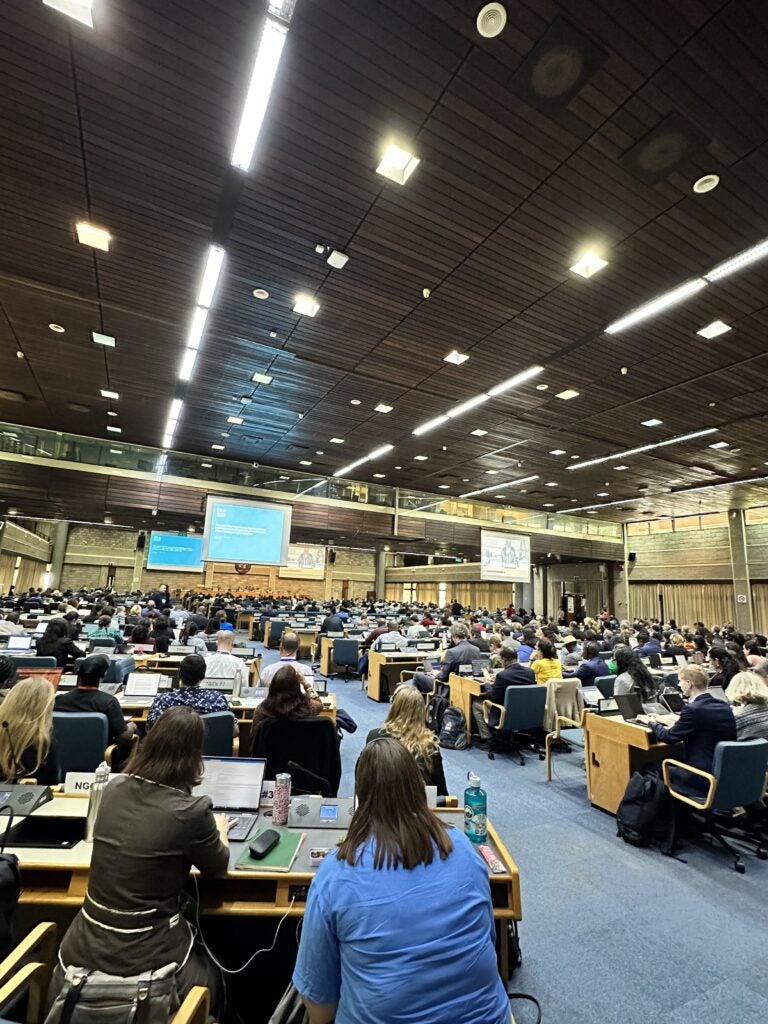April 12, 2024
INC-4 Explained: The Path to a Global Plastic Treaty
Estimated reading time: 0 minutes
BY: Rachelle Naddaf
Topics: Plastics
Global leaders will be descending on Ottawa, Ontario to make major decisions on how to address one of the biggest crises facing the planet: plastic pollution. The fourth session of the Intergovernmental Negotiating Committee (INC-4) to develop a treaty to address plastic pollution, including in the marine environment, will take place from April 23 to 29, 2024.
With major events for INC-4 kicking off on Earth Day, April 22, it’s fitting that this year’s Earth Day theme focuses on planet versus plastic. Policy change that focuses on eliminating plastic at the source is key to reducing plastic pollution. And that’s Oceana Canada’s objective at the global plastic treaty negotiations.
As we head into these major meetings, we’ve got answers to key questions about what INC-4 is and why it matters. So let’s get into it!
Q: What is INC and the global plastic treaty?
Representatives of the UN Environment Assembly (UNEA) committed to developing an international, legally binding instrument by the end of 2024 to end plastic pollution. With this commitment, came the requirement to convene an International Negotiating Committee – called INC – to develop a global plastic treaty (the “Treaty”). Delegates from over 160 countries come together at INC sessions to debate what priorities and measures to include in the final text of the Treaty that will help end plastic pollution. With an ambitious timeline, it was decided to have five INC sessions to create, refine and finalize the Treaty.
Q: Why do we need global action on plastic pollution ?
Plastic pollution is a global issue, it really is everywhere and affects everyone. It’s on the most remote beaches around the world, in Arctic sea ice, and the deepest depths of the ocean. Plastic is in the air we breathe and the food we eat. But it doesn’t end there. Micro- and nano-plastics and chemical plastic additives have been found in human blood, in lung, brain and liver tissues. They’ve even been found travelling through placentas to unborn babies. We still have much to learn about the threat plastics pose once in our bodies. However, we do know plastic chemicals and additives have links to diseases such as cancer, respiratory illness, infertility and decreased sperm count. Plastic pollution travels across international boundaries and needs to be addressed both domestically and on a global level.
Q: What happened at the previous INC sessions, 1 to 3?
The first INC session took place in Punta del Este, Uruguay at the end of 2022 to discuss the structure of the Treaty and what kinds of measures the world should take to address plastic pollution. Oceana Canada’s plastic campaigner, Anthony Merante, attended the remaining meetings, calling for strong action from Canada and real solutions to address the plastic crisis.
INC-2 occurred in Paris, France in the spring of 2023. It was full of debate on the level of ambition the global plastic treaty should take; in Paris we started seeing which countries were leaders in fighting plastic pollution. INC-3 was in Nairobi, Kenya at the end of 2023. This is where we saw low-ambition countries develop stalling tactics to try and weaken the Treaty. This brings us to the fourth session of negotiations, INC-4, taking place in Ottawa in just a few short weeks.


Q: Why is Canada hosting INC-4?
Canada has been actively involved in the INC process and has made several moves domestically with the goal of curbing plastic pollution. Canada is also a member of the High Ambition Coalition to End Plastic Pollution (HAC). This is a group of more than 60 like-minded countries representing every UN region. The HAC countries have committed to advancing ambitious action at INC to end plastic pollution by 2040. This is a bold commitment, and one that is worth striving for if we want to make a dent in the plastic crisis that continues to flood the oceans.
Q: What is the goal of INC-4?
Rapidly increasing levels of plastic pollution represent a serious global threat that negatively impacts the environment, economies, communities and human health. That is why an international, legally-binding Treaty is so important.
The ideal outcome of INC-4 is to have an updated draft text of the Treaty. As the Treaty stands now, the proposed objective is “to protect human health and the environment from the adverse effects of plastic pollution, including in the marine environment.”
Q: Why is Oceana Canada involved in INC?
As an observer and stakeholder at INC-4, Oceana Canada’s objective is to advocate for and urge Prime Minister Trudeau, Environment Minister Guilbeault and other world leaders to negotiate a robust, legally binding Treaty. Oceana Canada’s goal is to ensure the Treaty will effectively reduce the flow of plastics into the oceans. To do this, the Treaty must require signing countries to eliminate the most harmful plastics that pollute marine ecosystems. This international agreement is critical, and countries like Canada also need to lead by example implementing strong measures domestically.
Oceana Canada will push for commitments to be legally bound in the Treaty to prevent weakening by voluntary measures. We will also try to stop false solutions promoted by fossil fuel and plastic industries – like burning plastic, and statements like “improving recycling” and relying on bioplastics. While there is a place for actions like recycling, it alone cannot address the exponentially increasing levels of plastic pollution entering our environment every year. To have a meaningful impact, we must stop plastics at the source.
Q: How can I help?
In advance of the negotiations in Ottawa, we need your support. We know that 91 per cent of Canadians support a plastic waste reduction strategy that eliminates single-use products as much as possible. In addition, 92 per cent feel it is important for a plastic reduction strategy to include methods other than recycling, such as reusable alternatives. Now we need to make sure your voices are heard by the government as they negotiate this Treaty and have the opportunity to position Canada as a global leader fighting plastic pollution. The pressure is on to make meaningful progress in Ottawa.
Click here to add your name, calling on the Government of Canada to reduce plastic pollution >>
MOST RECENT
June 19, 2025
June 2, 2025
OPINION: From Crisis to Opportunity: Rebuilding Canada’s Fisheries for Climate and Economic Security

